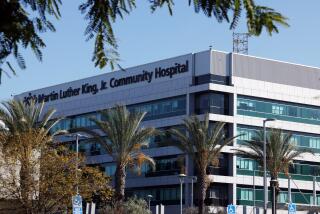Literacy and Breath
- Share via
With its annual summer camp for children who have asthma, Martin Luther King Jr./Charles R. Drew Medical Center has given new meaning to the words “teaching hospital.” The Willowbrook medical center has added reading, writing and science to the typical camp diet of swimming and crafts.
The weeklong outing takes more than 40 kids from nearby low-income neighborhoods to UC Santa Barbara to breathe fresh ocean breezes and escape, at least temporarily, the polluted city air that aggravates asthma. But the point of the camp is to provide longer-term relief by teaching the children how to manage their disease. Dr. Larry Robinson, director of King/Drew’s allergy and immunology division, believes that the best way to start is by making sure they know how to read. As in so many other of life’s basics, literacy has a profound effect on health. Someone who can’t read can’t follow the directions on a label of prescription pills or an inhaler.
A 1998 study by the American Assn. of Chest Physicians found that among asthma patients with less than third-grade reading skills, fewer than half knew when to take their medicine or which allergens to avoid, compared with almost 90% of asthma patients with the reading level of a high school graduate. Literacy is especially key for children in the South Los Angeles neighborhoods served by King/Drew. Rates of asthma have risen sharply across the United States among all economic groups in recent decades, especially so in inner cities, where the disease is epidemic. Partly a matter of genetics, asthma is triggered by smoke, smog and dust, pollutants that are especially prevalent in crowded urban environments, as well as by cockroaches, mice and other pests that are common in substandard housing.
Researchers also are finding that obesity plays a role, and that too is increasingly common in poorer neighborhoods, where nutritious groceries are in short supply and street violence keeps children indoors. Sadly, these same low-income neighborhoods too often have crowded and inadequate schools, making literacy programs all the more needed.
Asthma, untreated, is a painful disease. Inflamed lungs lead to a tightness in the chest, wheezing and coughing. It’s also an expensive disease, in hospital bills and lost days of school and, for parents, work. Preventing asthma -- through cleaner air, better enforcement of building codes, even safer streets -- is a topic for another editorial. Those who already have the disease need to know that it can be managed.
King/Drew’s effort to teach children how to do so is an example of what the troubled medical center can accomplish, and why it’s so important to fix the management and other problems that have kept it from doing more.
More to Read
Sign up for Essential California
The most important California stories and recommendations in your inbox every morning.
You may occasionally receive promotional content from the Los Angeles Times.













